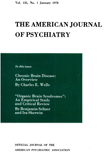Organic impairment in polydrug users: risk factors
Abstract
In a national collaborative study to assess the neuropsychological status of 151 polydrug users, the Halstead-Reitan Neuropsychological Battery showed deficits in 37% two to three weeks after they entered treatment and in 34% at three-month follow-up. Comparative rates for a group of psychiatric patients were 26% and 27%, and for nonpatients, 8% and 4%. Extensive and intensive use of CNS depressants and opiates correlated positively with neuropsychological deficit. Older, less- educated subjects with adverse medical or developmental histories were more likely to show polydrug-related organic impairment. Although there is some evidence that such impairment is reversible, the condition appears to be of at least intermediate duration and may be long lasting.
Access content
To read the fulltext, please use one of the options below to sign in or purchase access.- Personal login
- Institutional Login
- Sign in via OpenAthens
- Register for access
-
Please login/register if you wish to pair your device and check access availability.
Not a subscriber?
PsychiatryOnline subscription options offer access to the DSM-5 library, books, journals, CME, and patient resources. This all-in-one virtual library provides psychiatrists and mental health professionals with key resources for diagnosis, treatment, research, and professional development.
Need more help? PsychiatryOnline Customer Service may be reached by emailing [email protected] or by calling 800-368-5777 (in the U.S.) or 703-907-7322 (outside the U.S.).



